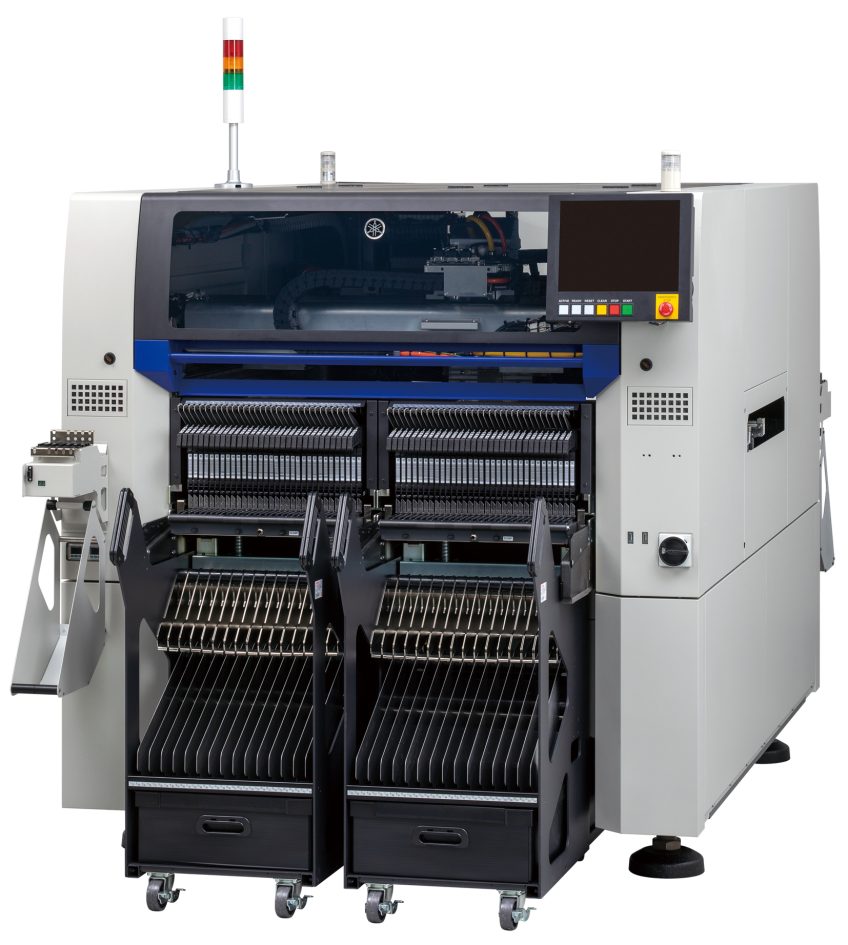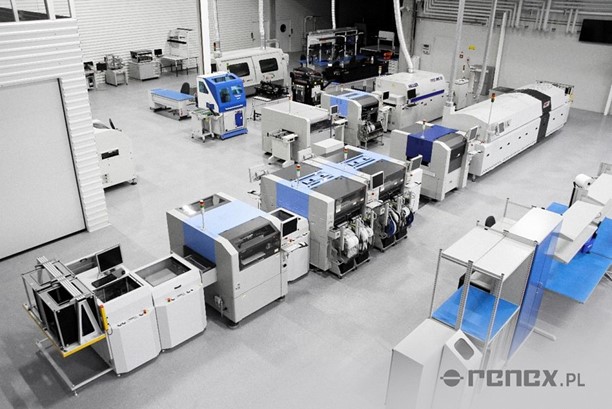Historically, surface mount assembly lines were designed with clearly defined customer requirements in mind: high volume/low variety for consumer products and low volume/high variety for industrial markets. But what happens when both volume and variety are flexible, and uncommon components and very high-quality expectations further complicate the situation?
The electrification of the automotive industry is an established trend that continues to accelerate. Car manufacturers strive to differentiate their products in the market and meet increasingly stringent legislative requirements regarding safety and environmental impact. Advanced technologies such as artificial intelligence and millimeter-wave radar, previously seen primarily in the aerospace industry and high-level research, are now available and affordable for consumers. The global automotive electronics market is worth over $270 billion, according to market research by Statista.
While this undoubtedly presents a huge opportunity for both the automotive and electronics industries, the ongoing electrification also brings significant challenges. Consumer expectations for technology are extremely high—they always demand something new and exciting. At the same time, the industry’s well-known focus on reliability and safety means that established standards and technologies change slowly.
Flexibility and Efficiency
On the production line, large components and connectors compliant with older standards must be handled alongside the latest SMD circuits, application processors, and power semiconductors in advanced surface mount packages. Yamaha SMT Robotics Division enables the industry to meet this challenge with the latest assembly solutions from the YR series. The YRM20 can handle both high variety and high volume, supporting the overall trend towards intelligent manufacturing.
Yamaha Robotics SMT Division enables the industry to meet this challenge with the latest generation of assembly solutions from the YR series. The YRM20, with its flexible design, can handle both high volume and high mix, supporting the overall trend towards smart manufacturing.
Early customers have appreciated new, important features of the YRM20, such as the high-mix (HM) placement head, which can handle components ranging from 0201 sizes to 55mm x 100mm sizes. This significantly simplifies the challenge of assembling large elements, such as edge connectors for automotive boards and tall capacitors in powerful assemblies, such as electro-hydraulic steering (EPS) controllers. In the past, it was necessary to set up a dedicated machine specifically for assembling these types of components.

The YRM20 can handle almost everything without stopping the line and changing the head. Additionally, its extended feeder capacity minimizes workload during changeovers, and compact feeder trolleys increase efficiency on the production floor.
Traceability
Another key challenge in the automotive electronics sector is the demand for traceability, which accompanies the industry’s high expectations for quality, reliability, and safety. With traditional SMT equipment, manufacturers may struggle to trace the causes of defects detected in post-flow inspection or downstream processes. Yamaha’s M2M communication, proven and integrated in the YRM20 and all machines in the company’s 1 STOP SMART SOLUTION offering, enables near-complete defect traceability. When a defect is found, supervisors can quickly trace it back to the source of the problem and fix it before more assemblies are produced with the same error. This increases productivity and improves quality by preventing any defective units from leaving the SMT line.
Yamaha’s YSUP smart factory software supports machine-to-machine communication and features time-saving functions such as automatic assembly program generation and assembly simulations, as well as flexible monitoring, analysis, and traceability packages. “The YSUP environment connects all the machines in the line and helps users quickly create and optimize their programs,” explains Daisuke Yoshihara, Yamaha’s General Sales Manager. “Smart factory tools enhance control and integrate with enterprise-level software, supporting resource management and planning. The Traceability package collects real-time data to precisely locate defects and their causes and can be expanded with the All Image Tracer for component assembly quality analysis.”

With these advantages in their surface mount assembly plants, electronics manufacturers supplying car manufacturers and first-tier automotive suppliers can handle a wide range of product types typical for this market, while maintaining short cycle times and minimizing downtime and line changes. The result significantly increases productivity, even when working with unusually shaped or tall components. Reducing changeovers increases equipment utilization while reducing operational errors.
The traceability function enables locating defective points and identifying defect causes much faster than standard lines. “Traceability is an issue that affects the entire automotive electronics supply chain,” adds Yoshihara. “YSUP Traceability helps manufacturing companies quickly and efficiently gather all the necessary information.”
As advanced electronic systems spread more widely in successive vehicle generations, managing functions from infotainment to comfort and lighting to propulsion and autonomous driving, Yamaha’s advanced assembly solutions provide manufacturers with flexibility and control, enabling them to deliver economical, high-quality solutions.
YAMAHA x RENEX
Yamaha Robotics, known for offering a wide range of devices and industrial robots for various industries, collaborates in Poland and the Balkans with the RENEX Group. As the official YAMAHA distributor in the region, RENEX not only provides devices but also advisory, service, and training services. RENEX Group serves production plants in various industries such as electronics, automotive, medical, food, and precision mechanics.
The RENEX Technology and Training Center allows you to familiarize yourself with the operation of YAMAHA devices and robots and to conduct tests and trial batches. The offer includes full production lines, including models YSM10, YSM20, YS12F, I-PULSE S20, I-PULSE S10, I-PULSE M20, and YSM40R. Features of YAMAHA machines include high performance, modular design, and support for large PCB elements, making them ideal solutions for many production processes.

As the exclusive distributor of YAMAHA robots in Central and Eastern Europe, RENEX Group not only supplies devices but also offers technical support through implementations, training, and consultations. The RENEX Technology and Training Center specializes in identifying production problems and selecting appropriate technological solutions. The RENEX Group Service Department was recognized as the best YAMAHA production equipment service in Europe in 2020, confirming the high quality of the services provided.
Training related to implemented robotic solutions is also conducted at the RENEX Technology and Training Center. Yamaha’s Training Center offers specialist knowledge on operating and programming industrial devices and robots. The center also helps in identifying production problems, adapting processes in enterprises, and advisory activities in the field of ESD and EPA protection.
Summary
In summary, the Yamaha Robotics SMT Division, through its latest YR series assembly solutions, enables the automotive industry to meet the challenges associated with increasing electrification and complex electronic systems. The YRM20, as a flexible placement machine, can handle both high mix and high volume production, while supporting the overall trend towards smart manufacturing.
Innovative features of the YRM20, such as the HM placement head, handling diverse components, increased feeder capacity, and compact feeder trolleys, contribute to increased efficiency and simplification of the assembly process. The YSUP software, connecting machines and enabling monitoring, analysis, and traceability, makes quality management and defect cause identification faster and easier.
By collaborating with Yamaha, automotive electronics manufacturers can deliver products with a wide range of applications while maintaining high quality and reliability. Yamaha’s advanced assembly solutions are key to flexibility and control, enabling manufacturers to deliver competitive, innovative products in the dynamically developing automotive market.
